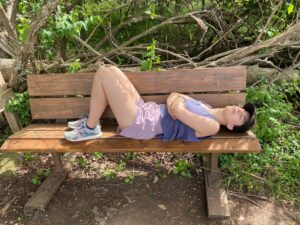French version of this story can be found at: https://css-scs.ca/share-your-sleep-story/sofias-story-2-french/
“In school, I would fall asleep in class.”
“At university, I was falling asleep through all my classes and my exams.”
“Then I would go home, and I would watch the lecture recording, and I would fall asleep while watching the recording.”
“I couldn’t work. I couldn’t stay awake for more than an hour without falling asleep.”
“I was sleeping at parties.”
“I used to feel anxious, wondering whether I would even be able to finish my exam.”
Before you start reminiscing about the times you dozed off during a boring lecture or a meeting, let me stop you. For Sofia, falling asleep wasn’t a funny story to share at the dinner table, nor was it a sign of laziness or flakiness when she cancelled plans. These were the symptoms of something much deeper that kept happening to her, repeatedly.
And Sofia experienced something more – something she described as “weird”.
I would feel a sudden weakness in my knees after an intense burst of laughter, I would have to lie down or sit down.
Sofia was 14 years old when she first experienced these symptoms. The quest to understand what she was facing became an expedition that lasted several years.
IT’S OFFICIAL
When her symptoms became even more flagrant, Sofia was pursuing a B.Sc. in pharmacology at McGill University. “It was tough. I needed to work harder to compensate and to keep up with others. I started realizing that I may not finish my degree without seeking some medical help.”
She had a hunch that what was happening to her was not normal. At age 18, Sofia decided to take matters into her own hands. A quick search on Google led her to hypothesize that she might have narcolepsy with cataplexy. “All of a sudden, all the pieces started to make sense.”
Realizing that a term describing her symptoms existed stirred a cocktail of emotions: liberation, relief, fear and confusion. “Knowing that I might have a sleep disorder, especially a rare one, I didn’t know what to do with this information. I did not know whom to reach out to. I wanted to know more. I also realized that it wasn’t just me. Other people have also experienced it. I wasn’t crazy. The things I felt have underlying medical causes.”
After six months of ringing up different clinics and sleep specialists and “just begging for someone to take me as a patient”, Sofia did a sleep test.
It was official. She was diagnosed with narcolepsy with cataplexy/type 1 narcolepsy.

A nap on a hike
IT’S NARCOLEPSY, IT’S NOT AN EXCUSE
Much like how the term ‘depression’ is often misused to describe a mere tinge of sadness, or ‘OCD’ for someone cleaner or more organized than those around them, narcolepsy is not about dozing off in dull meetings.
People with narcolepsy experience ‘sleep attacks’, sudden uncontrollable urges to sleep, which for Sofia can last up to ten minutes. Sofia shared, “When I was in school, I would get up to ten sleep attacks per day. I would get episodes of very sudden sleepiness, very sudden brain fog and fatigue, which is impossible to fight.”
She described them as “a state of half-awake and half-asleep. I don’t really know what’s going on. I’m not alert, but I’m not totally asleep either.”
Living with narcolepsy forces you to plan your day around it and learn to constantly listen to your body. Will you feel sleepy during a particular activity? When will you need to nap? What and when should you eat? Will you have enough energy to join your friends for an outing? How can you keep yourself alert during an important meeting where you can’t afford to fall asleep?
It comes with guilt and disappointment when you cancel your date at the last minute because you are fatigued or bail on your friends for a concert you planned months ago.
“I don’t fault anyone for not knowing about it and not understanding. But if I try to explain and I am still met with apprehension, it gets frustrating. If I want to go to bed early and everyone else is staying up late, then they make certain comments about it, which annoy me. I’m going to bed early because I have a sleep disorder. [At first, my parents] thought I was crazy because they didn’t even know what narcolepsy was, like most people. Although they supported me later.”
Cataplexy is another symptom of type 1 narcolepsy. For Sofia, the episodes of muscle weakness can last for a minute – one long minute filled with uncertainty, discomfort, panic and fright. The longer it drags on, the scarier it gets, not knowing when it will end.
It’s not something that you can control, and it is frustrating. You are laughing and the next thing you know is that you are on the floor. Sometimes, I even struggle to breathe because you just lose the muscle tone.
DAYTIME SLEEPINESS AND NIGHTTIME INSOMNIA
Narcolepsy affects the ‘visible’ parts of one’s life: work, social life, activities, and mental well-being, which ironically remains inconspicuous and is dismissed by society. And then, there are invisible impacts of narcolepsy on nighttime sleep. Sofia shed some light on her sleep struggles.
She tries spending at least seven hours in bed from 11 p.m. to 6:30 a.m. – time in bed, not time asleep. A few years ago, she developed insomnia. “You feel sleepy throughout the day, and at night, the moment you hit the pillow, you cannot sleep, which increases fatigue and daytime sleepiness the next day.”
“Insomnia was really, really hard.” Fortunately, Sofia’s doctor recommended that she enroll in a CBTI program – Cognitive Behavioral Therapy for Insomnia, the recommended first-line therapy for insomnia.
“CBTI helped me a lot. So, now my sleep is a lot better. Sometimes I still struggle with occasional bursts of insomnia where I won’t sleep well for a few weeks at a time, and I still apply the CBTI principles. CBTI is a huge help, and I recommend it to anybody that has any sort of sleep disturbance.” Read Janet’s story, whose chronic insomnia was managed by CBTI.
Today, on a good night, Sofia might toss and turn, but she manages to get at least four hours of sleep. On a bad night, she wakes up every two hours. It’s rare for her to sleep through the night without interruption. “It’s nice when it happens. Not being able to have a restful sleep is a struggle.”
Additionally, Sofia shared, “I get a lot of vivid dreams, often nightmares which wake me up.” Over time, she has learned to calm herself after waking up in panic from these nightmares. She continued, “Sometimes while waking up from the nap, I will hallucinate somebody walking into the room or somebody sitting down on my bed” – while her body remains paralyzed, unable to move. This is called sleep paralysis, a common comorbidity of narcolepsy. “Now, if I nap, I make sure that I’m either wearing a sleep mask or that the room is dark to prevent those visual hallucinations. If it does happen, I try to ground myself and remember that it’s not real.”
Narcolepsy impacted both Sofia’s waking and sleeping life. One would get desperate to find a quick fix and be rid of the symptoms as fast as possible. But Sofia was different.
PILLS, NO. HOLISTIC APPROACH, YES.
Despite the easy access to medication and a prescription from her doctor, Sofia shared, “I don’t take sleeping pills. I don’t like to take stimulants for daytime sleepiness, although I take them once in the morning and I am good for the rest of the day.”
Sofia was disappointed when, after the diagnosis, her doctor asked, ‘What do you want me to give you?’
“I did not know. They should have told me. So, they prescribed me medication and that was pretty much it.” In the midst of mixed emotions following her diagnosis, Sofia hoped for some consultation, a conversation about what to expect and a more holistic approach to managing her condition.
She realized that the medication didn’t work well for her. Sofia did plenty of self-learning and research on her condition, connected with different narcolepsy communities, and read others’ experiences on Reddit. “Having narcolepsy almost makes me want to lead a healthier life.”
Sofia shared her insights on managing narcolepsy. “I think treating narcolepsy should take a holistic approach. Apart from medications, a healthy lifestyle, physical activity, sleep, nutrition, and setting work boundaries all affect narcolepsy symptoms. It affects everyone, but it affects the people with narcolepsy even more. I think that sleep doctors don’t see the full picture of narcolepsy. Treating narcolepsy is so much more than just the medications.”
Sofia’s resilience and positivity exuded when she said, “I look at it in a positive way because the cards have been dealt and there’s nothing that I can do about it. So, I must use it in a way that empowers me and makes me feel better.”
She is hopeful that one day there will be a cure for narcolepsy.
There are a lot of exciting drugs for narcolepsy that are being tested. So hopefully in a few years, we’ll have better alternatives which work.

A proud M.Sc. graduate
NEED FOR CHANGE
Sofia is proactive in managing narcolepsy. But working on yourself – every day – is a difficult task, especially when you are exhausted from battling the symptoms of your condition while keeping up with the regular demands of life.
Drawing from her own experience, Sofia shared how individuals, organizations and society can better support those living with narcolepsy.
- Increase doctors’ knowledge: She highlighted the need for doctors to deepen their knowledge of narcolepsy. “I think sometimes doctors give you any prescription you want because that’s all they can do, or all they know. Everybody is different, everybody has different experiences. Unfortunately, medications cannot always fix everything, and they come with side effects.”
- Share burden: Sofia shared that receiving counselling by a doctor or psychologist early in her narcolepsy management journey would have shared the burden. “It would have made things a lot easier – having someone to guide me along the way and help me figure out how to manage my symptoms. But I got there by myself.” Consistently doing the right things for oneself simply because they know it’s the right thing to do is difficult. Motivation, along with many other factors, plays a major role in behavior change. Having support and reminders along the way can encourage and guide people suffering from narcolepsy through this long and arduous process.
- Raise awareness and beat stigma: Narcolepsy is considered a rare disease, and people are unaware of its symptoms. For the people affected, like Sofia, it can be hard to play Google for everyone and even receive skepticism in response. Spreading empathy and debunking the stigma surrounding it through awareness and advocacy is crucial. Sofia shared, “Needing more rest should not be taboo or a sign of laziness. When you say you didn’t sleep well, people respond, ‘Well, okay, so what?’ But for someone with narcolepsy, not sleeping well affects your whole life.” We must remember that sleep is not optional; it’s a required biological function, and a lack of it costs us physical, mental and social well-being.
- Workplace accommodations: Sofia suggested, “Offering more flexibility at work for someone who needs longer or more frequent breaks, and allowing naps, could be small changes that make a huge impact on us.”
- Insurance coverage: Costs of medications can quickly add up. “My medication was covered through my previous insurance with the university. And recently I switched, and I noticed that none of it was covered.”
A MESSAGE FOR OTHERS
Today, Sofia is a clinical research coordinator in a major unit conducting clinical trials for cancer. She’s active, resilient, and passionate about her work, which involves constant interactions with colleagues, patients, and doctors. Sofia has an important message for others living with narcolepsy.
It is so important to advocate for yourself if you have any medical issue and not let others’ perceptions get in the way.
“So, if you think that there’s something wrong, go see medical professionals. Knowing can be empowering. And if the medical professionals aren’t taking you seriously, keep advocating for yourself and keep searching for a doctor who will take you seriously. Listen to your symptoms. Listen to your experience. You don’t have to suffer in silence. It’s likely that there are other people that are experiencing the same things that you’re experiencing. You are not alone. Trust yourself and trust that you will be able to lead the life that you want to lead.”

Madhura Lotlikar, Ph.D. candidate, Neuroscience, McGill University
